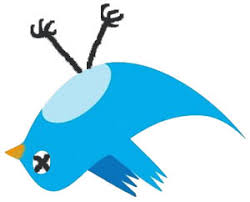




Great post and great series of question from Scott Fox regarding Twitter and if it has "jumped the shark"...making itself irrelevant in the future of online communication and marketing. Entitled Twitter has Jumped the Shark, Mr. Fox lists five reasons why he feels that Twitter is "over" and this is the beginning of the end. His reasoning is very interesting...and includes (along with the great Among his reasons are:
1. Twitter's usability threshold is too low: Basically, the combination of 140 characters, zero cost, and semi-legal moral standing has overwelmed the benefits of the service.
2. Twitter's value assumes synchronicity...where in reality, it rarely is. In short, Twitter requires both parties to be actively involved to be valuable. That is very hard to do given the world we live in.
3. Twitter is ruled by the elites: Those that "have" thousands (or millions) of followers get proportionally better clicks / follow-up. Those that don't...well, don't. Given that no one auto-follows anymore growing beyond a few thousand users is an almost impossible feat.
4. Twitter is F*ing everywhere: Twitter's APIs are awesome...but the tools that have spawned from this level of access are almost out of control. As Mr. Fox notes, "it easier than ever before to pre-schedule, re-tweet, and manage multiple Twitter accounts with little added value (or human presence!)."
5. Twitter things it should advertise too: It was one thing when individual Tweeters made money through the likes of Sponsored Tweets or Be-A-Magpie, but now Twitter itself wants in the game. All that means is more noise in the already crowded Twittersphere.
So...what do you think? I think Mr. Fox has done a great job asking if the Emperor really has no clothes, though I am not sure I would declare Twitter dead just yet either. From a business standpoint, I find great benefits with Twitter in finding new ideas, sharing thoughts / articles / blogs and finding new contacts and professionals in my area of expertise. Yes, a lot of this communication is "one-way"...though that isn't necessarily a bad thing either. Frankly, I don't always want (or need) a two-way conversation and Twitter helps me share information in a reasonable manner. While occasionally I may "miss" something on Twitter, I have learned that the most interesting things tend to show up more than once...and sooner or later I catch on.
That being said, do you agree with Mr. Fox? Is the future what he stated: "Will Twitter evolve to be just another alerts service? Or simply a quick delivery mechanism for 140 character teasers of meatier content posted elsewhere?"
















